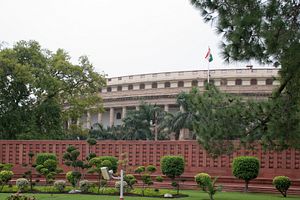India’s national politics may have made a massive swing from an era of coalition politics and gridlock to one in which the Bharatiya Janata Party-led National Democratic Alliance will rule with little reason to fear opposition parties. Indeed, it now appears that the Indian National Congress, India’s grand old party and the party which led the United Progressive Alliance (UPA) coalition for the past 10 years, will be unable to field a candidate to take on the position of Leader of the Opposition in the 16th Lok Sabha (the lower house of India’s bicameral legislature). The lack of an opposition leader in parliament hearkens back to the prime ministerships of Jawaharlal Nehru and Rajiv Gandhi, both of whom governed in an era of Congress Party dominance in parliament.
Under Indian parliamentary procedural rules, in order to field a candidate for that position, an opposition party must hold at least 10 percent of the 545 seats, or 55 seats, in the Lok Sabha. Congress won just 44 seats, rendering it technically incapable of fulfilling that role. Congress’ spectacular electoral loss was to the advantage of certain regional parties in India, including the All India Anna Dravida Munnetra Khazagam and the All India Trinamool Congress — each of whom acquired in excess of 30 seats in the Lok Sabha. The decision to not have an opposition leader in the Lok Sabha has been formalized by the Lok Sabha’s Speaker Sumitra Mahajan after consultations with the BJP government.
With a majority in the Lok Sabha and a fragmented opposition, the BJP’s election victory will have long-lasting consequences in Indian politics. Most immediately, the party will find itself able to pass laws with more ease than any Congress-led government since the 1980s. As the Carnegie Endowment on International Peace’s Milan Vaishnav and Danielle Smogard show, since 1996 the effective number of parties (weighted by seats) represented in the Lok Sabha has never been lower than 5. With this year’s election, it has sunk down to 3.5, demonstrating an atypical concentration of power in a country known for its multipartisan legislative politics.
The Congress Party has a plurality of seats in the Rajya Sabha (the upper house of India’s bicameral legislature). Congress continues to field 67 legislators there while the BJP fields just 42. The UPA coalition has 79 out of the 245 seats comprising the Rajya Sabha. The Rajya Sabha is notably less powerful than the Lok Sabha particularly because all that is needed for financial bills to be legally passed is approval by the Lok Sabha — if the Rajya Sabha does not approve a financial bill, it is still considered to have passed. Similarly, the Rajya Sabha does not have the power to initiate a motion of no confidence in the government.

































